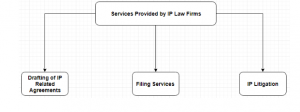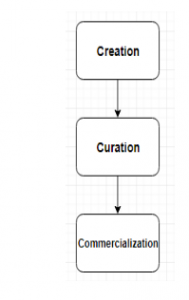This article is written by Anubhav Pandey, Team LawSikho.
There is a massive need for an army of talented lawyers who can create contracts, register intellectual property, enforce agreements and IP rights, resolve disputes, handle investment agreements, JV contracts, licensing of various IP rights, protect legal interests of the media companies, ensure compliance to myriad laws and keep the industry in shape.
Let us trace the trajectory of an Intellectual Property from its birth. An IP is created. The true owner of the IP takes the first step and applies for the rights of his Intellectual Property. This requires a lot of drafting work. Now getting the final protection is complex and time taking process. The filing services are lengthy, cumbersome and require industry expertise.
Firms holding expertise in filing services are there to help the owner of the IP. With filing comes the IP related disputes and hence litigation. IP related disputes (for example, invention not being novel or already published) delays the process of conferring rights on the true owner of an IP.
Therefore, when we track this trajectory, we find a lot of areas to cash in and build up your practice around. The IP practices can be categorised into 3 broad areas.

#1 Drafting of IP Related Agreements
Intellectual Property Assignment Agreement
Commercial exploitation of Intellectual Property requires a great deal of drafting and negotiation skills. Why Edison, commercially speaking, is regarded as a better inventor than Tesla? Because Edison exploited his inventions commercially, making it accessible to the masses. On the contrary, Tesla kept his inventions secret.
As an owner of an IP, the proprietor’s aim is to commercially benefit out of the IP. To bridge the gap between the owner of an IP and the market, IP related agreements are important and hence legal professionals who can draft are in high demand.
By an IP Assignment Agreement, the owner transfers his right to develop or sell the said intellectual property to another person or legal entity.
Intellectual Property Assignment Agreements are technical. But once you acquire the skill set for drafting such a complicated agreement, you can charge a handsome fee for your services.
Imagine spending INR 28,000 for learning the skill set required for drafting IP Assignment Agreement and once the skill is acquired, charging INR 30,000 for one Assignment Agreement! Sounds exciting, doesn’t it?
Does the Return on Investment sound lucrative? Wait for more. This is just the tip of the ice-berg. The following are the Assignments agreement LawSikho teaches in its Diploma in Intellectual Property, Media and Entertainment Laws.
- Assignment of Patents
- Assignment of Trademarks
- Assignment of Designs
- Assignment of Copyrights
- Assignment of Confidential know-how
- Assignment of Geographical Indications
What are the contractual Means to protect your IP?
- Non-Disclosure-Agreement (NDA)
- Non-Solicitation Agreement
- Non-Compete Agreement
A lawyer, on average, charges a minimum INR 10-15,000 for a standard NDA. What if you learn all the skill set required for protecting an IP?
How much can you make for protecting a single IP? How about multiplying a single IP with, at the minimum 15 IPs a month.
I leave the calculations up to you.
- Technology Licensing or Technology Transfer Agreements
I will break a myth with this article. Most of us believe, a Google search on pre-designed templates for technical agreements can land us to our required result.
Stop there!
As a matter of fact, Senior Associates, who are responsible for training fresher’s blasts out on them for using free templates/PDFs.
Let me give you an exercise.
Try looking for a pre-designed template on Consumer Complaint. Once you are sure about the template, try comparing it with an actual plaint drafted by any local member of the bar. Reach out to me if you do not know any local lawyer and want an actual copy of consumer complaint.
Alright.
Coming back to Technology Transfer Agreements. Technology transfer is a mode of transfer of technological knowledge from one company to another or within the same company. Technology transfer can be in the form of tangible knowledge – knowledge embodied in physical goods, services and codified in blueprints, designs, technical documents, etc or intangible knowledge or know-how – like skills, tactics which the people have gathered or learned over a period of time in a particular sector or field for operating the technology.
Intellectual property (IP) involved in a technology transfer contract includes patents, trademark, design, know-how. Developing and creating technologies or IPs involves huge investment, but imitation of those IPs can be done very easily.
You can easily charge INR 30,000 (minimum) for a Technology Transfer Agreement. The upper limit can even be a figure with five zeros.
All it takes is acquiring the right skill set. Law School and even Internships for that matter leave you empty handed with an unloaded gun. No bullets, no training on how to aim. As a matter of fact, correct skill sets is what you need the most.
Once you’re equipped with the correct skill set, the sky’s the limit!
Which skill sets relating to drafting can you learn?
One should look for exposure to strategic and drafting work in connection with Intellectual Property, Media and Entertainment industry-related work – patents, copyright, trademark, design rights, plant variety rights, geographical indications etc. To begin with, you should know to:
- Draft a patent application
- Draft and file a passing-off suit
- Vetting of advertisements and marketing material
- Preparing documentation that helps to protect trade secrets
- Responding effectively to patent trolls and other malicious attempts to extract money through unfair IP prosecution
- Draft various media and entertainment contracts that deal with IP
- Drafting effective IP protection and assignment agreements in employment and consultancy agreements.
You can read more on 10 types of contracts drafted by Intellectual Property Lawyers.
#2 Intellectual Property Filing Services
Businesses and innovators need easy, cost-effective ways to protect their inventions, their brands, and their designs in multiple countries. Firms providing IP filing services offer a range of services for protecting IP.
Firms especially dealing with filing services functions at three levels.

Step 1 – Creation
Intellectual Property emerges out of an idea. Idea gives birth to innovations. When you have an idea, firms specialising in IP advisory (Mostly all IP Filing Services firm have a team on IP advisory) will help you convert your idea into an Intellectual Property. These firms have industry knowledge and can be your advisor on your inventions/ideas/brands etc.
They provide services such as:
- Novelty Searches
For a Patent registration, one of the key ingredients is novelty. Is your invention novel?
Not according to you, but as per industrial standards.
How will you figure out the answer?
The firms will get your invention checked by experts before filing. This saves prosecution cost and time.
The firms through their Novelty Search Services assists inventors by providing an in-depth novelty assessment of the invention in various technical domains. This is done through researching on most relevant patents and literature which might act as prior art for an invention.
- Technology Strength Determination
Imagine investing tons of resources into an idea which you wish to convert into a patent. In the middle, you encounter a technical loophole (Prior Publication, Invention falling under Section 3 of Patents Act etc). All your investment, resources will go to waste.
Therefore, before investing in an idea, the firms through their specialised Technology Strength Determination Services, get your subject technology assessed by subject matter experts. This will not only enlighten you about the existing prior art but will also analyze how beneficial is your subject technology as compared to existing alternate technologies fulfilling the same objective which could be very crucial at the time of monetizing the obtained patent.
Other services falling under the domain of Step 1, i.e, creation are:
- Patent Drafting & Illustrations
- Patent Proofreading
- Patent Application Filing
- Trademark Clearance Search
- Trademark Application Filing
- Design application filing
- Trade Mark Registration
- Trade Mark Renewal Services
Step 2 – Curation
After the first step (Creation) is done and the filing is complete, comes the second step, getting the final protection, i.e curation. This is the step where you get a right over your Intellectual Property so created.
These services include:
- File Track Analysis
A resource person called the file wrapper maintains all the records and communications taking place between the applicant and the patent office. The record of these files proves to be a powerful tool during litigation process and formulation of assignment strategies (as it is deemed than an invention will definitely attract litigation).
- Office Action Response
An inventor is usually strained as soon as he receives an office action issued by a patent examiner. Preparing a response to the office action issued could be one of the most crucial tasks.
This requires handling the subject with utmost care and understanding of the technicalities around the subject as well as law. A loose, unprepared response might lead to the issuance of further office actions.
Therefore, the response to Office Action requires a high level of technical knowledge and interpretation of law. Highly experienced team members of the filing services firm are capable of drafting technical arguments in response to office actions.
Other services falling under the domain of Step 2, i.e, curation are
- Docket Management
- IDS (Information Disclosure Statement) Management
- Renewal Management
- IP Identification
Step 3 – Commercialisation
Once you get the protection, it is time to reap the benefits of your hard work. The steps involved in commercialisation is mostly relating to the drafting of agreements and negotiating deals. We already discussed this aspect in the first segment of this article.
Other services falling under the domain of Step 3, i.e, commercialisation are
- Infringement Analysis
- Evidence of Use Charts (EoU or Claim Chart)
- Patent Invalidity Searches
- Patent Portfolio Categorization
- Freedom to Operate Searches
- Potential Buyer Identification
- IP Valuation
- Competitor Analysis
Copyright Services
Unlike trademarks and patents, registration of copyright is optional. Under Indian law (and in most other legal systems), copyright comes into existence the moment a work is created. However, from an enforcement perspective, registration is often preferred.
Then why are Copyright Registration services so sought after?
In the absence of registration, a third party can claim that a particular work that a business is using was created much earlier by the third party. There is also a chance that records kept by the creator may not be considered reliable by enforcement authorities or courts. Further, it is important for a business to be in a position to avoid unnecessary litigation (or to be able to dismiss it as baseless), even when a third party’s claim is unfruitful, particularly where intellectual property is an essential part of the valuation of the business.
Read more on copyright registration here.
Copyright Services Include
- Filing of Copyright Applications with the Copyright Office for registration of original and creative work.
- Responding to Copyright Objection(s) in respect of applications and all communications from the Copyright Office.
- Enabling Copyright Registration of Sound Recordings and musical compositions.
- Registration and compliances in respect of Computer Software Copyright.
- Registration of Logo Copyrights for goods and services.
#3 IP Litigation
Litigation over disputes relating to Intellectual Property has an interesting history. In between 2000 – 2012, an expert doing filing services of IPs made excellent money. By 2014, this trend saw a dropdown. Online forums, providing premium IP filing services at low price point began dominating the industry and hence filing services became saturated within no time.
While registration has turned not so profitable for most IP lawyers, licensing, assignments, objections, oppositions, litigation has massively increased in volume over the years, turning IP law as a very lucrative profession.
If you are looking for best IP Law Firms to work with, here we have a list of Best IP law firms to work for in India for lawyers under 35.
Litigation around Intellectual Property is largely concentrated in the cities of Delhi, Chennai, Kolkata, Mumbai, Hyderabad and Bengaluru.
Disputes on trademark take the lead in terms of overall volume of litigation. This is followed by Copyright and Patent Litigation. Disputes relating to misuse of Trade Secrets, Know-How and Confidential Information are also frequently litigated.
Quite often, wheels of criminal litigation are set into motion in counterfeiting cases. It is found that criminal cases with IP roots are filed as a tool for forcing a settlement with respect to the rights of the owner of the Intellectual Property.
What kind of cases an IP lawyer gets, and what type of work does an IP lawyer do?
A lawyer holding expertise over IP matters can provide a strategy for litigation to a set of clients across different industries and business. Primarily, a lawyer doing IP matters represents clients in all manner of litigation in the court of first as well as second instance, IPAB and even the Supreme Court of India.
Lawyer not only practices conventional IP subject matter such as trademarks, patents, designs, copyrights, trade secrets and confidential information, but also practices expanded claims of unfair competition under common law, competition law, arbitration, the law of torts, constitutional challenges, media & entertainment law, IT & e-commerce, plant varieties, geographical indications, etc.
To summarise, an IP Lawyer requires skill set on :
- How to defend your client or organization in IP litigation
- Holding expertise in all categories of IP Litigation
- Trademark opposition and litigation
- How to conduct a trademark watch to identify infringement
- Opposition to trademark claims
- Enforcement of trademark
- Passing off suits
- Trademark infringement litigation
- When to opt for criminal prosecution
- Groundless threat proceedings
- Remedies for cross-border infringement of trademarks
- Exceptions to infringement, trademark of personal names, honest and concurrent use, prior user etc.
- Patent litigation
- Office action response filing
- Pre-grant and post-grant opposition
- Remedies
- Defences
Watch our YouTube interview on A Career In Intellectual Property Litigation discussing kinds of cases an IP lawyer gets, and what type of work does an IP lawyer do.
How to acquire the skill sets for building up an excellent practice around IP laws?
Sum up all the three categories of services provided by IP law firms we discussed and you will get more than 50 such areas of IP practice which can bring lots of work along with remunerative rewards.
The question is how to acquire the pre-requisite skills?
Answer to this question lies in layers.
If you are a law student, you might think internships will bring enough expertise and teach you these skills. The answer is no.
Short Internships of 1 month or even 2 months leaves a lot of gaps and pitfalls. No associate will be willing to put their time and resources on you when they know you are going to vanish in a month or two. Rather they will prefer spending time with their family or with their cases.
For bagging a PPO, you need to work like the person who is one level above you, as an intern, do the work like an associate.
If you are looking for an answer on how to acquire these skills, you can reach out to our experts from the RnD team for a free career counselling session by registering here.
What more?
If you are a:
- Lawyer looking to build a practice in trademark law, copyright law or patent disputes
- Law student looking to work in IP law firms or IP or TMT teams in big law firms
- Entrepreneur or a director who wants to master legal aspects of intellectual property, media and entertainment business
- Mid sized IP law firm (appointing between 50-200 lawyers) which engages in registration of IP, managing IP portfolios, enforcement of IP rights, disputes and litigation over IP, licensing and assignment of IP rights and such other work.
And looking for practical training on different kinds of work that is required to be performed by lawyers and other professionals, we have a course on Diploma in Intellectual Property, Media and Entertainment Laws.
After the course, we assure that you will develop practical skills as much as a lawyer working at a big law firm in these teams will have after a year or two of experience.
Registration closes on January 31.
For any queries, our team of experts is always here to help you. You just need to comment below!
Other course like this one where the enrolment closes soon are:
DIPLOMA
Diploma in M&A, Institutional Finance and Investment Laws (PE and VC transactions)
Diploma in Intellectual Property, Media and Entertainment Laws
EXECUTIVE CERTIFICATE COURSES
Certificate Course in Advanced Criminal Litigation & Trial Advocacy
Certificate Course in Real Estate Laws
Certificate Course in Insolvency and Bankruptcy Code
Certificate Course in Media and Entertainment Law: Contracts, Licensing and Regulations
Certificate Course in Legal Practice Development and Management
Students of Lawsikho courses regularly produce writing assignments and work on practical exercises as a part of their coursework and develop themselves in real-life practical skill.
https://t.me/joinchat/J_0YrBa4IBSHdpuTfQO_sA
Follow us on Instagram and subscribe to our YouTube channel for more amazing legal content.
 Serato DJ Crack 2025Serato DJ PRO Crack
Serato DJ Crack 2025Serato DJ PRO Crack










 Allow notifications
Allow notifications



[…] post 50 Highest Paid Services Provided by IP Law Firms appeared first on […]